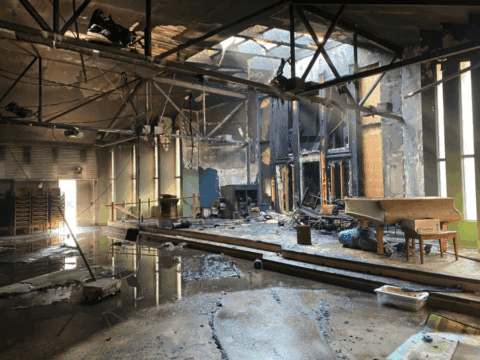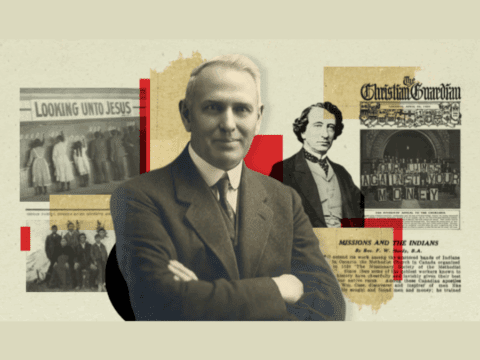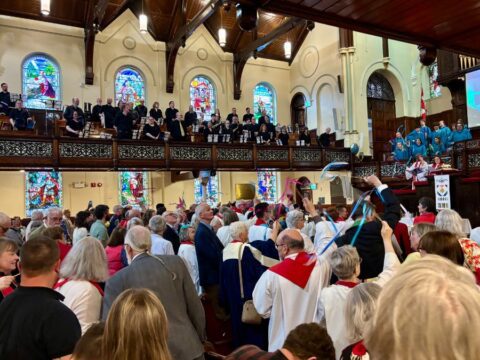At the General Council office of The United Church of Canada, I work alongside the general secretary, who is also an incredible preacher. One of the greatest gifts and challenges I’ve received from Rev. Michael Blair is his position that the church often domesticates biblical messages.
In writing this piece, I realize that the Advent story is a story we domesticate. If Joseph and Mary were returning home for the census, why couldn’t they stay with family? There is some speculation that they may have been refugees. Jesus was to be born in a stable among the barn animals. Even for biblical times, that had to be a little out there. But we tell the story like it’s only Jesus’ birth story — taking out the hard parts.
This year’s Gospel reading for the first week of Advent, Mark 13: 24-37, is full of apocalyptic imagery: “In those days, after that suffering, the sun will be darkened, and the moon will not give its light, and the stars will be falling from heaven, and the powers in the heavens will be shaken.” And then Christ comes riding in the clouds, with great power and glory. But it is the end of the reading that adds the urgency: “Therefore, keep awake — for you do not know when the master of the house will come, in the evening, or at midnight, or at cockcrow, or at dawn, or else he may find you asleep when he comes suddenly. And what I say to you I say to all: Keep awake.”
Apocalyptic scriptures are ultimately about faith and hope in God’s eternal goodness, but also despair at the current context. It is easy for us to identify with the despair. And it’s easy to domesticate hope, to look for the great rolling in of Jesus in the clouds. But that is not how the story happens.
No — an unassuming family seeks refuge where there is none to be found. Three wise elders were awake enough to follow a star and bring gifts of gold, frankincense and myrrh. But had you been there, would you have known that the family was holy? Would you have provided more suitable lodging? Would you have noticed a star to the east that guided you in your discernment? No wonder Mark calls us to keep awake.
Over the past year since I was elected moderator, I have noticed some trends. We don’t have enough regional and national staff; we have communication challenges; reports came out earlier this year that The United Church of Canada is shrinking faster than any other Christian denomination in this country. None of these are surprises, despite the despair they may invoke. And I see the church looking for hope.
But I also see us looking west when we should be looking east. When we look west, we miss the opportunity to see the star beckoning us to discipleship. I see aging congregations that are tired, but ignoring the small signs that they are no longer viable. I see expectations that the regional council or General Council should “fix” this situation, but I also see reactions or remarks of “How dare you suggest x, y, z?” And perhaps some of that comes from communication challenges, but I also think a lot of it comes from anaklesis, a Greek term that means to lean on people or beliefs to the extent that we protect the self and the status quo from change.
In 2006, when we launched WonderCafe, an online platform designed to engage 30- to 45-year-olds in the United Church, one of the biggest things we learned was that there is often a mismatch between who we say we are and how we treat each other — especially newcomers. The welcome and freedom that folks found in the online space did not match their experience in their local congregation. This continues to be true.
Despite the tremendous work at many levels of the church to undertake the Affirm United process, it doesn’t really guarantee true welcome or safety for folks who do not identify as able- bodied, white, cisgender or heterosexual. We still either ignore newcomers or smother them with pressure to do everything.
I also see a great deal of conflict in the church. I wonder how much of this is arising because of the pressure on our scarce resources. Often bullying is tolerated because congregations feel they don’t have other options or because the bully holds the purse strings. I hear of communities of faith who discourage their ministry personnel from taking study leave or using their continuing education benefit. I hear of congregations who use employment security as a bargaining chip to get their own way. I’ve also seen ministry personnel — who are exhausted and worried about the future of the church — quash the ideas of congregants who have new ideas or reasons to hope.
Communities of faith have much freedom to try new things and to consider what ministry and discipleship might look like in the future. Eliminating Presbyteries has clearly created a void, and we need to find ways for communities of faith to connect into the regional and national networks and programs of the church. That is only possible when we take the time to dream about what a flourishing church could look like.
More on Broadview:
- United Church chooses seven principles to guide its justice work
- Is it bad if your online ministry goes viral?
- The United Church’s numbers have dropped more than any other denomination
My favourite economist, Mariana Mazzucato, argues in her book Mission Economy: A Moonshot Guide to Changing Capitalism that we need bold, innovative experiments in change that are goal oriented. So often we fail when we try to “solve problems,” when instead we should be trying to achieve our goals.
This is why I love the new call and vision of The United Church of Canada — that we aspire to be a church of deep spirituality, bold discipleship and daring justice. It allows us to live into the apocalyptic and to heed the words of the prophets and of Jesus who tell us over and over again through scripture that the status quo is no longer working.
What if “keeping awake,” as we are called by Mark, means paying attention? Looking for the subtle signs of both danger and opportunity? What if it means stepping aside when you’re tired and letting someone else lead in a way that is uniquely theirs? What if we let go of being a neighbourhood church and instead become a thriving destination church? What if we showed up for those 2SLGBTQ+ refugees sponsored under Canada’s Rainbow Refugee Assistance Partnership — even if they aren’t Christian families with children who we secretly hope will join our church? What if Jesus was an unhoused person who snuck into the back pew on Sunday morning — would he recognize the church as Christ’s body?
When I joined the team at First United Church in Vancouver’s Downtown Eastside in 2017, the organization had been in serious decline for decades. Despite attempts at redevelopment and envisioning a different kind of community for folks in the neighbourhood, nothing had really worked. The building was on its last legs, and there was a lot of animosity between staff and management, which led to the staff unionizing. One of the reasons I’d been hired was that I had some energy for another attempt at property redevelopment.
At the time, there was pressure to “just get the church rebuilt — and figure out a strategic plan later.” But I insisted that we sort out who we wanted to be so that we had a north star to follow. Did we want to be the presence of the United Church on the corner of Hastings Street and Gore Avenue? Or did we want to be a ministry that serves the most marginalized? If this marginalized community gets displaced to another part of Metro Vancouver, would we follow?
The board decided that we were there to serve that neighbourhood, even if the neighbourhood changed around us. So then we talked about a 50-year horizon — what were we working toward? We landed on a neighbourhood where the worth of every person is celebrated and all people thrive. Now First United’s mission is clear: it nurtures each person’s spirit through ministry, housing, advocacy and community services in the face of the often-intersecting challenges of extreme poverty, historical and personal trauma, mental illness and oppression.
The organization has also finally embarked on the demolition and redevelopment of its church site. For the most part, good labour relations exist between management and staff, and trust in the community has been rebuilt. This was due to all of us keeping awake.
Not everything we tried was successful. But we were able to work toward our goals, rather than try to fix our problems. And that is what I hope for this beautiful, fallible church of ours. That we continue to do the hard and productive work of hoping — because we believe in the possibility of transformation, even if the coming transformation is not yet clear.
Keep awake — lest he arrive suddenly and find you sleeping.
***
Rt. Rev. Carmen Lansdowne is the 44th moderator of The United Church of Canada.
This story first appeared in Broadview’s December 2024 issue with the title “Keep awake: How apocalyptic scriptures can guide the church in hard times.”














